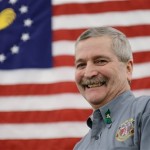Dispatchers Honored for Role in Newtown Response
Michael Melia
HARTFORD, Conn. (AP) — From the first call from inside Sandy Hook Elementary School, the severity of the attack was immediately clear to dispatcher Robert Nute.
The person on the other end of the line was a woman Nute has known for 30 years, but it hardly sounded like her.
“There was no question in my mind,” Nute said. “The woman I was speaking with, I could tell the difference in her voice.”
As shots rang out from the gunman’s semi-automatic rifle, the dispatchers sent police racing to the school and worked to keep panicked callers on the line. Within a few minutes, the rampage was over, with 20 children and six women killed before the gunman committed suicide as police arrived at the schoolhouse.
The staff at the Newtown Emergency Communications Center has won praise from officials and colleagues around the country for their work that day. Six months after the Dec. 14 massacre, the center director said the staff has been lifted by the outpouring of support as the dispatchers recover emotionally, along with the community that still peppers them with calls over anything out of the ordinary.
After losing contact with the woman who first called, Nute feared she had been killed, but he learned she survived.
“It was six minutes, maybe eight, and that part of it was over,” he said. “My partner and I did exactly what we were supposed to do under those circumstances. Only then do you allow that personal impact to take over.”
Nute, who attended Sandy Hook Elementary as child and is a volunteer Sandy Hook firefighter, said the hardest work that morning began in the immediate aftermath of the shooting, as parents sought information and groups called offering assistance and donations. The center director, Maureen Will, said it received as many as 300 calls an hour and the phones were broken within three days from the constant jamming of the buttons.
The center has staff of 10 people, including Will, who said they had received active-shooter training only the month before the tragedy and put it to work by keeping their composure during the ordeal. It has been recognized with honors including the Outstanding 911 Call Center Award, presented in March in Washington. And communications offices across the country shipped flowers and cards to the center.
“It was the worst day of our lives, but professionally, it was the best day because we did what had to be done,” she said.
The 911 recordings from Newtown have not been released to the public. The prosecutor leading the investigation into the massacre, Danbury State’s Attorney Stephen Sedensky III, has argued that releasing the calls could jeopardize the ongoing probe. The Associated Press is asking the state Freedom of Information commission for the recordings to be released.
With personal connections to both police and victims, dispatchers in small communities like Newtown are vulnerable to the same kind of emotional trauma experienced by those on the scene of a tragedy, said Fran Roberts, a clinical psychologist in Marlton, N.J. who offers stress management services to first responders.
“One of the things that makes trauma worse is the sense of helplessness,” she said. “Because of the nature of the dispatching job, they are being held back except for passing information along.”
Will said there have been some emotional struggles, and anybody who needed time off has been given time off.
While the calls have slowed since the tragedy, Will said people do not hesitate to alert police to strange sights or sounds. She said dispatchers, like many others in Newtown, dealt with feelings of deja vu last month when the school system was locked down because of a threatening phone call to another elementary school. The FBI is investigating the call.
In a town where he more typically deals with calls regarding falls at nursing homes, Nute said his biggest takeaway from the tragedy is the importance of being prepared for the unexpected.
“Don’t ever say it can’t happen,” he said. “We all get complacent and comfortable in our lives. The minute you let your guard down and say it can’t happen, it could very well happen.”


